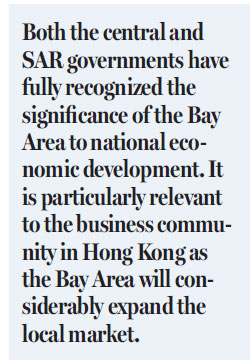Collaboration on innovation the key to Bay Area success
Updated: 2018-09-06 07:20
(HK Edition)
|
|||||||||
The central government has recently embarked on a number of preferential policies to demonstrate its commitment to developing Hong Kong into an international innovation and technology hub under the Guangdong-Hong Kong-Macao Greater Bay Area framework.
On Aug 15, Vice-Premier Han Zheng presided over the first plenary meeting of the leading group on development of the Bay Area in Beijing. Subsequent to that meeting, Chief Executive Carrie Lam Cheng Yuet-ngor announced three initiatives to promote research collaboration between the mainland and the special administrative region.
Firstly, the Guangzhou Institute of Biomedicine and Health and the Beijing-based Institute of Automation, both under the Chinese Academy of Sciences, will set up branches at Hong Kong Science Park; secondly, a cooperation arrangement to be signed between the central government's Ministry of Science and Technology and the Innovation and Technology Bureau of the Hong Kong SAR; and thirdly, the establishment of the Bay Area academician alliance in Hong Kong. These initiatives have revealed the dynamic interaction between the central and SAR governments as well as the intention to gradually integrate innovation development on both sides.

In the 2018-19 Budget, the SAR government proposed to set aside HK$10 billion for building two research platforms for healthcare technologies and artificial intelligence-robotics technologies development to attract the world's top scientific research institutions and technology enterprises to Hong Kong. An additional HK$10 billion will be allocated to the Hong Kong Science and Technology Parks Corporation for the construction of research infrastructure and a Smart Campus. Considering that the two national research institutions to be stationed in Hong Kong are in line with the territory's creative strategy, I genuinely believe that this arrangement is not a coincidence, but rather the materialization of the deliberation over the years between the Ministry of Science and Technology and the Innovation and Technology Bureau.
Vice-Minister of Science and Technology Huang Wei visited Hong Kong in May and announced that national scientific research funds would be open to applications from higher institutes and research institutions in the SAR. However, many local scholars hold the view that it will not bear much fruit in the short term since local researchers are not familiar with the rules on application. Contrary to their viewpoint, I believe opening branches of two national research institutes in the Science Park could be a strategic move by the central government to facilitate the application of funding. They will not only continue to dedicate efforts to research, but also can accelerate the process of integrating innovation development between the mainland and the SAR. They will seek to join the local industries, education and research community to apply for national research funding. Supported by their ample experience, local research institutes will find it much easier to secure national research funding, a scenario that bodes well for further cooperation between the two sides.
When local education institutes and research centers become accustomed to applying for national research projects and funding on their own, the Ministry of Science and Technology and the Innovation and Technology Bureau will be drawn into an even closer partnership. To this end, it is a wise decision for the central government to strengthen the connection between these two policymaking authorities with a cooperation arrangement. This initiative once again reflects its commitment to developing the SAR's innovation industries.
Lastly, if the two national research institutes can make good use of the Bay Area academician alliance and mobilize all talents within the region toward researching and developing medical science, AI and robotics technologies that target the needs of the country, it will certainly create a bright future for the Bay Area and in turn boost China's competitiveness worldwide.
To conclude, both the central and SAR governments have fully recognized the significance of the Bay Area to national economic development. It is particularly relevant to the business community in Hong Kong as the Bay Area will considerably expand the local market. But the development of the Bay Area is not without hindrance, particularly from traditional businessmen who tend to be more conservative and shy away from changes (innovation in this context). From an academic point of view, the success of the Bay Area hinges on effective cooperation between the mainland and the SAR, particularly in the business-to-business level.
The author is associate dean (external affairs) of engineering at the Chinese University of Hong Kong and a member of the CPPCC National Committee.
(HK Edition 09/06/2018 page8)